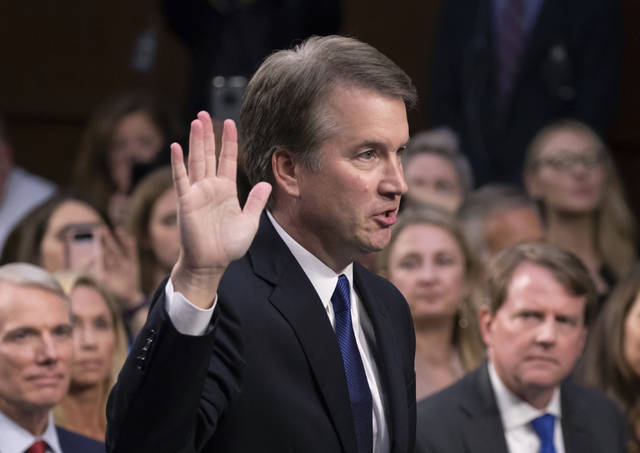NEW YORK — It started as a series of phone calls among old high-school friends and ended up embroiling 65 women in the firestorm over a sexual assault allegation that could shape the Supreme Court.
In a matter of hours, they signed onto a letter rallying behind high court nominee and their high school friend Brett Kavanaugh as someone who “has always treated women with decency and respect.” And they signed up, whether knowingly or not, for becoming a focus of scrutiny themselves.
The powerful strength-in-numbers statement, offered to bolster Kavanaugh’s denial of a claim that he attacked a girl at a party during their high school years, has drawn questions from journalists, social media skeptics, even Hollywood figures.
How well did the women know him? How could a statement and 65 signatures come together so fast after outlines of the allegation first surfaced publicly? And after subsequently hearing the details and learning that his accuser was a woman some of them knew, do they stand by their declaration?
Yes, say more than a dozen signers who have since spoken to The Associated Press or other media outlets.
“Brett wouldn’t do that in a million years. I’m totally confident. That would be completely out-of-character for him,” said Paula Duke Ebel. She said she interacted with Kavanaugh hundreds of times while they were students in a close-knit constellation of single-sex Catholic schools around Washington in the 1980s.
Christine Blasey Ford, a 51-year-old psychology professor, said an intoxicated Kavanaugh cornered her in a bedroom during a party in the early ’80s. She said he pinned her on a bed, tried to undress her and clamped his hand over her mouth when she tried to scream, and she escaped only when a friend of his jumped on the bed and knocked them all over.
The letter was released the morning after the allegation first got wide public attention. The letter and its roster of supporters seemed to come at supersonic speed and out of the blue.
Women who organized and signed it say it was a rapid response by a social network that endures decades after they graduated and was easy to mobilize: a chain of friends calling, texting and emailing friends from a Washington-area world where many still live and see each other.
Meanwhile, hundreds of alumnae of the secular private girls school that Kavanaugh’s accuser attended have signed a letter supporting her.
“We believe Dr. Blasey Ford,” they wrote.
The letter backing Kavanaugh is from women who vouch that they knew the federal appeals court judge personally as a high school student. Several said they got to know him well through sporting events, parties and other socializing or the phone calls that occupied teenage weeknights in the pre-texting era.
One worked with him at a summer camp. A second sought his help with homework. Two dated him. Some still see him at social functions.
At least one, though, hadn’t spent time or talked one-on-one with him but still felt comfortable attaching her name based on the social situations they shared.
Others who signed declined to comment or didn’t respond to inquiries. The AP left messages for all 65.
Some have been surprised by the attention.
Julie DeVol said she didn’t really anticipate the letter would provoke such intense interest, though she sensed Kavanaugh’s critics “would do anything” to delay his confirmation vote.
Kavanaugh, 53, has called Ford’s allegation “completely false.” The Senate Judiciary Committee has invited him and Ford to testify at a hearing Monday, although Ford’s lawyers say she wants the FBI to investigate her allegation before she testifies.
After word of a high-school-era sexual misconduct allegation against Kavanaugh emerged last Thursday afternoon, Meghan McCaleb launched the letter-writing effort, contacting friends who contacted more friends, she said. They had 65 signatures by Friday morning.
The quick response sparked a flare of tweets, including from actresses and liberal activists Debra Messing and Patricia Arquette, questioning how anyone could line up so many high school pals so quickly to defend someone they didn’t actually go to school with. McCaleb says the answer is simply “how strongly all of us believe in Judge Kavanaugh and his integrity.”
Some signers are conservative, such as former Republican National Committee spokeswoman Virginia Hume. Others are Democrats.
“This has nothing to do with politics,” said one of the signers, Megan Williams. “It’s just about character.”
It is also, inescapably, about whether they credit another woman’s account of sexual assault.
McCaleb said “I’m not certain” when asked on Fox News whether she believed Ford, whom she described as a friend of a friend. “She alleges that she had this traumatic event, and I feel like it is not the Brett Kavanaugh that we know.”
Sharon Crouch Clark didn’t know Ford and feels fine about having signed the letter, notwithstanding the allegation.
“If it happened to her, that’s horrible,” Clark said. But she questions whether the incident occurred as Ford described it, noting that Ford said she couldn’t recall certain details about the date, place and other aspects.
Women who signed the letter said they didn’t know about or recall the party Ford described, and they said her account of a “stumbling drunk” Kavanaugh didn’t jibe with their memories of a boy who drank some beer alongside them but never lost control or crossed a line with girls.
“He was the kid who always did the right thing,” Williams said.
———
Kunzelman reported from Silver Spring, Maryland. Associated Press writers Dan Sewell in Cincinnati and Alanna Durkin Richer in Boston and researcher Rhonda Shafner contributed to this report.


